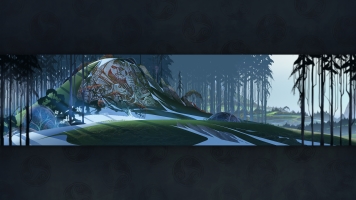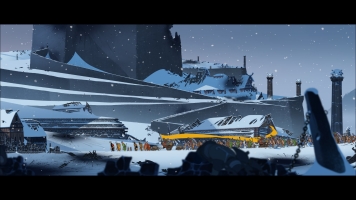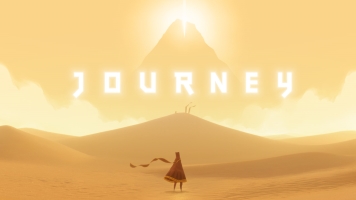Encore: An Interview with Austin Wintory
 Austin Wintory is a Grammy-nominated composer of films and games, and recently contributed his talents to the incredibly evocative score for Stoic's The Banner Saga. His work spans a number of fascinating projects, including the solo piano stylings of Pocketwatch Games' Monaco and the score that earned him the aforementioned Grammy nomination, thatgamecompany's PlayStation 3 hit Journey. Austin is a busy man these days, but graciously took some of his time to answer my questions. Read on below!
Austin Wintory is a Grammy-nominated composer of films and games, and recently contributed his talents to the incredibly evocative score for Stoic's The Banner Saga. His work spans a number of fascinating projects, including the solo piano stylings of Pocketwatch Games' Monaco and the score that earned him the aforementioned Grammy nomination, thatgamecompany's PlayStation 3 hit Journey. Austin is a busy man these days, but graciously took some of his time to answer my questions. Read on below!RPGFan: Can you tell us a little bit about your background? What kind of musical training do you have? How did you become involved writing music for video games?
Austin: I have been a gamer my whole life, and I discovered music around age 10. So I've actually been playing games longer than I've been at all involved in music. Before age 10, I didn't really listen to much music, and it simply wasn't a part of my life. I was all about games, films, and other normal kid things, like dinosaurs... I'm still into dinosaurs. But when I discovered music, I immediately knew that was what I wanted to do, and specifically that I wanted to be a composer. And so because of the overlapping passion of music and games, it was inevitable that these things would collide. The way in which they did collide was when I was in college getting my composition degree from USC; I met some fellow students who were developing games. One of those was Jenova Chen, who was creating his masters thesis called FLOW. And of course FLOW ended up being very successful, and he made a deal with Sony, and we remade it as a Playstation game, and that is what got my career going.
RPGFan: How do you approach a new project? Do you start with an idea in mind and work with that, or do you generally work based off what information the developers give you?
Austin: I basically start with whatever they have available at the time. Sometimes I come in really early, in which case it's about having conversations with the developer and conceptualizing the ideas that they are pursuing long before there are even existing prototypes. That's probably my favorite way to work. That was the case for FLOW and JOURNEY. However, sometimes I am brought in partway through, when the game is somewhat functional and offers somewhat of a glimpse of what it will be. And then other times I'm brought in quite late, and the game is fairly close to being finished, and is just being fleshed out. So I have to respond to whatever is on the table at the time and try to do my best to make the music an organic part of that. No matter what the case. But I basically don't think there is a wrong way to do it. It is often dictated by so many simultaneous variables that you just roll with what makes the most sense.
RPGFan: What kind of music do you listen to? What are some of your favorite artists or groups?
Austin: I mainly listen to classical music, both the repertoire and contemporary works. I constantly listen to the new music by my friends and colleagues to see what they are up to. I buy lots of new soundtracks. I also love to spend time going through Bandcamp and sites like that, just discovering new music and seeing what's out there.
RPGFan: What are some of your favorite artists and composers? Any favorite songs?
Austin: I absolutely love the music of Pete McConnell and all the video games that he has done over the past twenty years. I really love both personally and musically Jessica Curry. She's a very dear person in my life and someone whose music I really cherish. I recently heard Bear McCreary's new title theme to the Starz show Black Sails, and I think it's probably my favorite work he's ever done. It's absolutely tremendous. And on the concert music side, I've just finished listening to a brand new album called Lonesome Roads by my friend Dan Visconti, and it is truly wonderful. There is a piece on that album called "Black Bend" that is one of the most satisfying five minutes I've heard recently.

RPGFan: If there were no obstacles in your way, what would be your dream "collaboration" job (working with other composers or musicians)?
Austin: Honestly, I have no idea. I am very accustomed to working alone, and think that I often do my best work in that sort of private laboratory environment. The musicians that I love collaborating with, I don't collaborate with in the manner that I think your question is implying... If you are talking about co-composing, I think that there are a number of people that it would be very interesting to co-compose with, but I don't necessarily sit around dreaming about it. That said, there are a few more traditional artists out there that I would be delighted to explore an opportunity with, like Bjork.
RPGFan: What is the most rewarding part of being a composer for you?
Austin: Easily the collaboration with all of the people involved. So whether that means game developers, film makers, conductors, theatre directors, etc... and of course the musicians themselves who are performing and recording. Add all those people up, and to me, that is music itself.
RPGFan: Are there any genres/styles of music that you think aren't used very often in gaming? Any that you would like to work with and have not yet?
Austin: There are untold, infinite piles of unexplored music in games, and in music in general. So its impossible for me to get any more specific than that. My whole future is dedicated to exploring.
RPGFan: What attracts you to the projects you work on? As mentioned earlier, you provide some really fascinating bits of info on this topic on the Bandcamp pages for your albums, but in this case I mean more generally speaking for all of your projects?
 Austin: For me, it's always about the people making the project first and foremost. I love working with people that I have a really personal investment in; people whose future means a lot to me. So that's usually by far the first and most important criteria. But sometimes people are just making really compelling and interesting experiences, and I want to find a way to be a part of it. A good example of that recently was the game SOUNDODGER, developed by Michael Molinari. In this case, I saw a nearly finished game, and I reached out to him and said, "Hey count me as your newest and biggest fan. I think this is excellent." And he wrote back and said, "Hey, how would you like to be a part of it?" And I said, " Oh wow, that would be amazing, let's do it!" And so I was able to contribute a bit of music to the game. So in that case the game was what lead me to him, but upon meeting him, I discovered a really great guy and was extremely happy with how the whole thing turned out.
Austin: For me, it's always about the people making the project first and foremost. I love working with people that I have a really personal investment in; people whose future means a lot to me. So that's usually by far the first and most important criteria. But sometimes people are just making really compelling and interesting experiences, and I want to find a way to be a part of it. A good example of that recently was the game SOUNDODGER, developed by Michael Molinari. In this case, I saw a nearly finished game, and I reached out to him and said, "Hey count me as your newest and biggest fan. I think this is excellent." And he wrote back and said, "Hey, how would you like to be a part of it?" And I said, " Oh wow, that would be amazing, let's do it!" And so I was able to contribute a bit of music to the game. So in that case the game was what lead me to him, but upon meeting him, I discovered a really great guy and was extremely happy with how the whole thing turned out.
RPGFan: Something that we're really excited about at RPGFan is the continued growth in awareness and appreciation of game music from all areas: widespread attention, new methods of distribution, arrangements and remixes, Grammy nominations (wink) are all rapidly changing how VGM is perceived not just by gamers, but also by a non-gaming public, and the diversity of styles is really exploding. Do you have any thoughts on these trends?
Austin: Game music is going to spread into the general public's awareness at the same speed as games themselves. Just like with film, we are beholden to the medium for which we are writing. Both, I believe, are on a fast rise. The idea of being a "gamer" is quickly receding into the past in the same sense that we don't self identify as "readers" or as "movie-goers." It's just that some people are more than others. And I think that's the path games are on as well. Everyone in society will be a "gamer" to some degree, and so too will they appreciate game music. It will just be yet another medium in which people might find music that they love, and it will be a place full of interesting opportunities for musicians of all flavors.
RPGFan: Speaking of that Grammy business, what was that like? It's thrilling that you're on the forefront of the greater appreciation of VGM, and as one of the people responsible, we'd love to hear your thoughts on what the experience was like.
Austin: All I can say is that it was surreal. But from an intellectual standpoint, I don't think that by any means JOURNEY and my music for it deserves to be the first to ever be nominated. There were many scores before it that were great, including some that are deeply inspiring to me personally. So any of those are equally if not more worthy of that. I think I mainly just got lucky, which makes the whole experience all the more surreal.
RPGFan: What's in the future for you? What mountains do you hope to scale as you move forward as an artist?
Austin: Taller and taller ones.
RPGFan: One of my personal favorite pieces of music you've produced is "Weary the Weight of the Sun." When it comes up in the Banner Saga, it's unbelievably fitting — the sort of lonesome tone along with that really disquieting, distorted background sound that elicits feelings of the gray light filtering down on the world is incredibly effective. Could you talk a little bit about that one, or, if you prefer, more broadly on The Banner Saga's music?
Austin: THE BANNER SAGA was a long and elaborate road. I really, really loved working with Stoic, and I had such incredibly phenomenal musicians to work with in the form of the Dallas Winds, their conductor Jerry Junkin, and the various other soloists that I brought in, like Peter Hollens, Malukah, and Taylor Davis. So all around, it was a dream. And the big part of why it was such a special project was exactly as you identified — the emotional quality of the game was very peculiar. A sort of desolate gray nobility. I really loved that about it from the very first moment I saw their Kickstarter pitch video, which they sent me in the middle of their campaign to see if I was interested in working with them. It felt like this final tale of a great warrior or something. It was full of strength, but also had an inherent sadness that comes from accepting one's own ultimate death. It was an interesting sort of cousin to the spiritual and archetypal heroic themes of JOURNEY. So I'm very happy that the music resonated with you, because you never know how it will strike listeners. All I can do is try to be honest in expressing the way the game makes me feel.